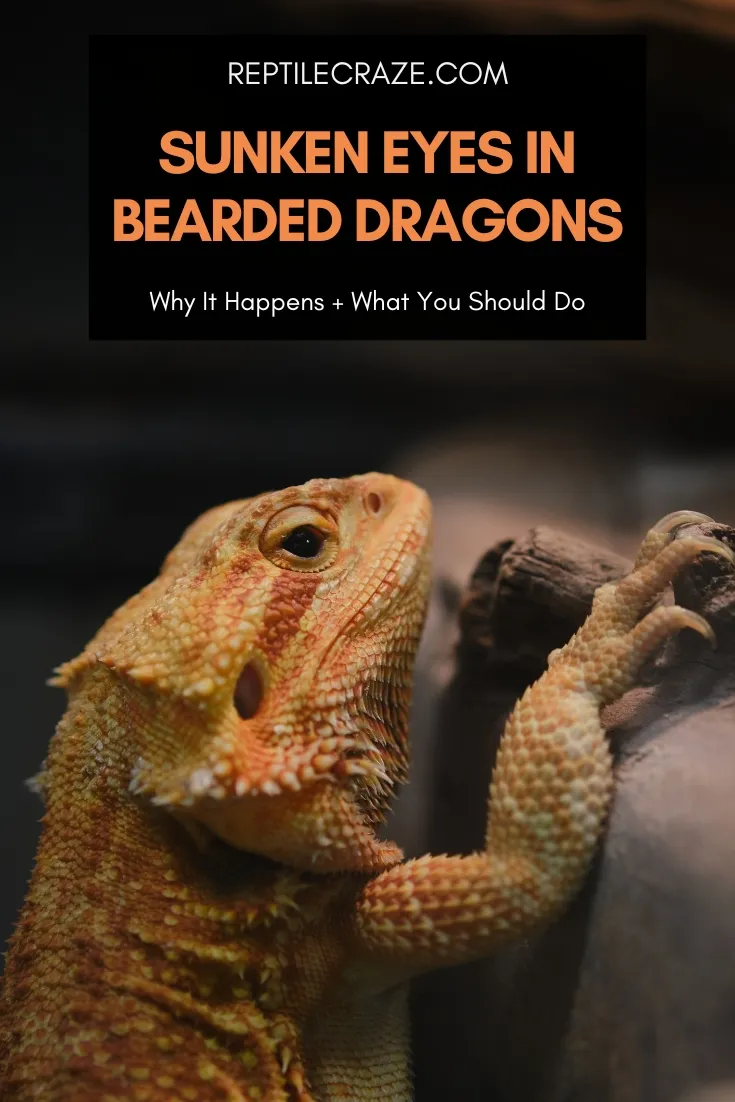
The cliche, “eyes are the windows to the soul,” holds true for humans and our bearded dragon besties, too. The eyes of bearded dragons reveal a lot about their health. Sunken eyes, for instance, are symptomatic that all is not well and should never be ignored by pet owners.
Sunken eyes in bearded dragons are signs of dehydration, illness, parasite infestation, or weight loss. Treatment involves addressing the underlying cause, such as hydration and medication. Taking action immediately when seeing sunken eyes may help prevent further complications.
You will know if you have nursed your beardie back to health if its eyes return to normal. Read on to learn how to spot sunken eyes immediately and know what emergency actions to take.
Table of Contents
How Do Sunken Eyes On A Bearded Dragon Look?
The eyes of healthy bearded dragons should appear clear, bright, and alert. There should be no visible signs of cloudiness or opacity.
The eyes should be wide open when awake, and the eyelids able to close completely when asleep.
Sunken eyes in bearded dragons, on the other hand, appear receded or deeply set within the eye socket. As the eyes sink into the socket, they look smaller than usual.
If the eyelids seem droopy or loose, they could indicate an infection or parasite problem.
Overall, sunken eyes in a bearded dragon can be an alarming visual indicator of illness or dehydration.
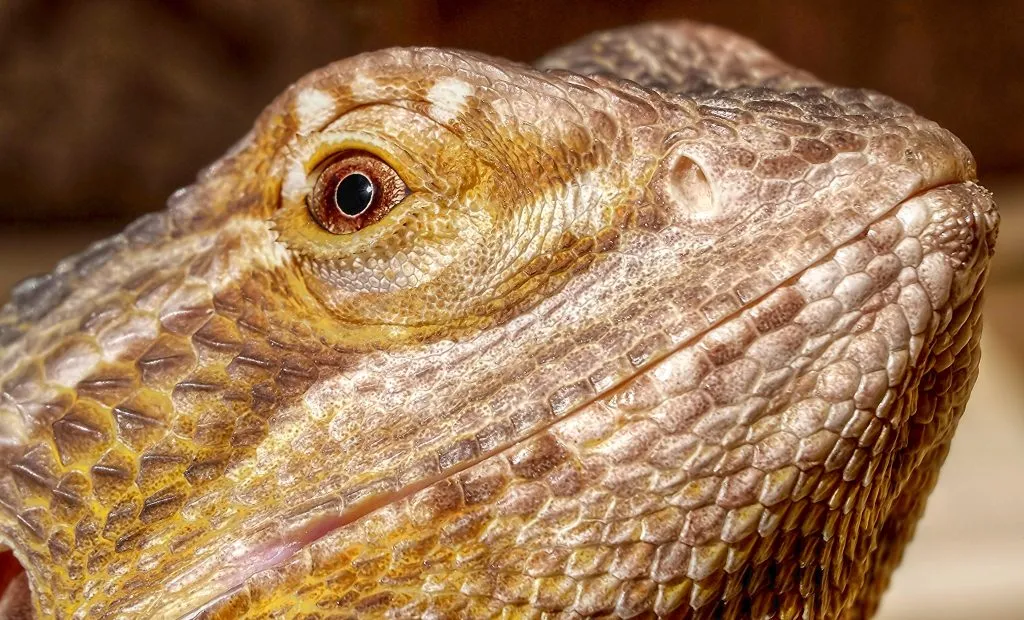
What Do Sunken Eyes In Bearded Dragons Tell Us?
When you see your bearded dragon with sunken eyes, it usually doesn’t bode well. Its condition may need your urgent action and attention.
The following issues commonly cause sunken eyes in bearded dragons:
- Dehydration
- Parasites
- Illnesses or diseases
- Weight loss
1. Sunken Eyes: Leading Symptom of Dehydration
Dehydration is the foremost reason for sunken eyes.
Many think these lizards only live in arid habitats, such as the dry, rugged Australian outback. Bearded dragons may only appear to require a little water. In truth, they are thirsty reptiles that need to imbibe plenty of water to survive.
Beardies live in habitats that vary in location and humidity levels. You can find them in woodlands, coastal dunes, grasslands, and deserts. These reptiles are exposed to seasonal rains and love humid burrows and damp clumps of grass.
As captive lizards, they must get moisture from their
This brings us to the question: What can cause dehydration in bearded dragons?
Dehydration from Low humidity
It is a misconception that beardies must be kept in dry conditions and that high humidity contributes to respiratory illness. These are dangerous fallacies.
Contrary to common husbandry knowledge, bearded dragons need access to high humidity at varying levels in their enclosures.
Not many people are aware of a bearded dragon’s need for a humid habitat. At humidity levels lower than 30%, your animal could dehydrate and fall ill with respiratory problems.
Dehydration often causes constipation and impaction as well.
Low humidity could cause the beardie to lack moisture, making their eyes appear sunken.
Bearded dragons thrive in ideal humidity levels between 40% and 60%. Some keepers have found that keeping humidity levels as high as 65%-70% at night by misting the enclosure has kept their animals healthy and well-hydrated.
Also, providing them with humid retreats such as burrowing areas or slightly damp sphagnum moss would help you meet their humidity requirements.
Bearded dragon keepers must learn to rethink the common notion of keeping dry enclosures.
Watch this important video supporting husbandry for high humidity.
First Aid:
Let your bearded dragon soak in warm water for 10-20 minutes daily. They might also drink this water, so it must be kept clean.
Installing a quality hygrometer in your pet’s enclosure will help you gauge whether your beardie gets the correct moisture levels from its environment.
Dehydration Caused by Unrecognized or Low Availability of Water Sources
Beardies get a lot of moisture from their diet of fruit and vegetables. Watercress, watermelons, and romaine and cos lettuce are examples of foods with high water content.
Even when fed with high-moisture
It is crucial to observe if they actually drink out of the bowl. Strangely, bearded dragons often don’t recognize the water in their dish as water!
Did you know? A bearded dragon can dehydrate beside a perpetually available standing dish of water?! How? They might not know it’s water!
Help them recognize water by agitating movement in their water bowl to attract attention. You may use a drip or slow aeration system.
Your shallow bowl should also be big enough for your dragon to soak in. They will poop in their makeshift tub, but it will keep them happy and hydrated. Besides, emptying and refilling dirty water is an easy and hassle-free daily routine.
Dehydration Caused by High Temperatures
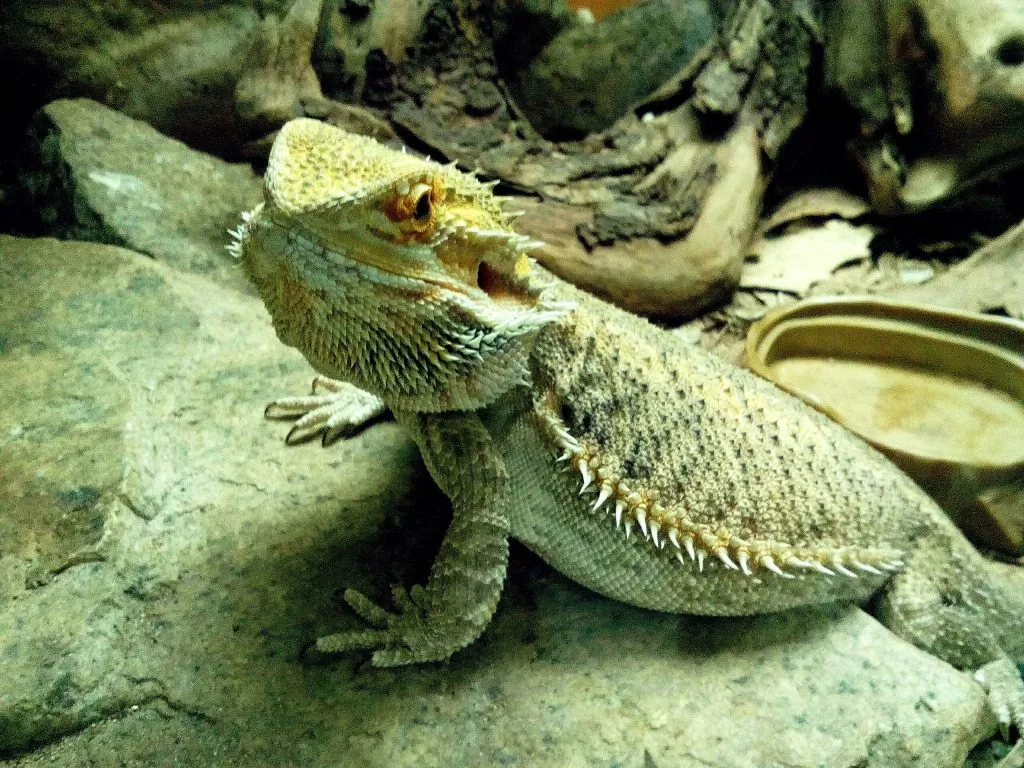
Your pet must be able to choose to transition between hot, warm, and cool areas in its enclosure during the day.
Without this choice for escape, high temperatures can cause a bearded dragon to drool and lose moisture rapidly. Sunken eyes will soon tell you that your pet is dehydrating.
The temperature in the areas of its enclosure should vary. The cooler end should sit at around 75℉ (24℃), and the warmer place at 85°F(29°C). The basking area is hottest at around 100°F (40°C).
By checking the temperature of various areas in the enclosure, you can prevent those sunken eyes and help your pet stay hydrated.
2. Sunken Eyes: A Symptom of Parasite Infestation
Parasites can cause a bearded dragon’s eyes to look sunken.
Mites, for instance, look for the soft parts and skin of your beardie’s body to burrow under so they can drink the blood.
These parasites, looking like tiny black or red dots, commonly infest the eyes and ears where there is a lot of moisture and high blood flow. They will even dig in and lay eggs.
Get medications from your vet that treat your dragon internally and externally.
Meanwhile, remove your pet from its enclosure and bathe it. Afterward, it must go in a clean, secondary home, a quarantine
The entire main enclosure would need sanitizing, even the plants and decor. Sterilize any tool you use as well. Parasites easily contaminate most things it comes in contact with.
3. Sunken Eyes: A Symptom of Disease or Ailment
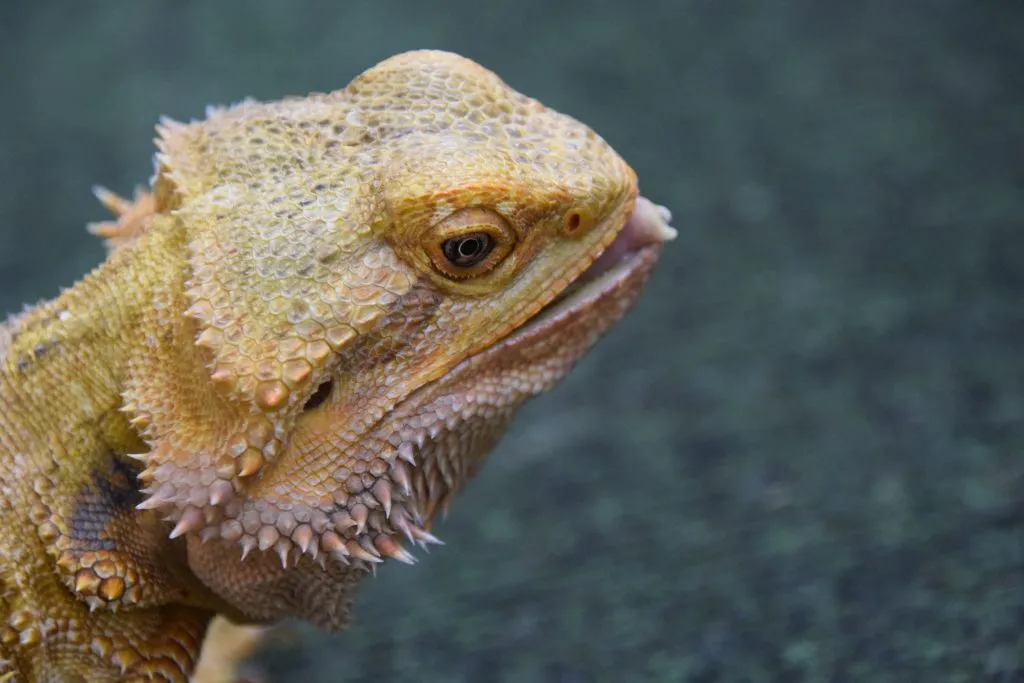
Inappropriate husbandry, which affects a bearded dragon’s living conditions, such as access to water, temperature, and humidity, can cause dehydration. Dehydration, in turn, can cause bearded dragons to fall seriously ill.
Sunken eyes can reflect kidney disease, impaction, or mouth rot.
When your pet has kidney issues, it may not be able to filter its blood well. This condition needs urgent medical attention.
When something gets stuck in the digestive system, it can lead to impaction. Most of the time, a large piece of
The blockage can lead to dehydration and vice-versa. In any case, sunken eyes may warn of dehydration and impaction.
As bearded dragons tend to poop in the water, try giving your lizard a soak for 10-20 minutes a day to encourage it to pass its waste. If bathing or soaking doesn’t help, you may need to visit the vet.
Sunken eyes may also indicate gum or mouth rot (stomatitis).
As mouth rot causes pain when bearded dragons eat or drink, this condition can lead to severe dehydration with sunken eyes as a warning.
Note: If you are worried that your beardie might be dying, read our article on that here. It will show you all the signs that your bearded dragin is dying and what you can do to help.
4. Sunken Eyes: A Symptom of Weight Loss
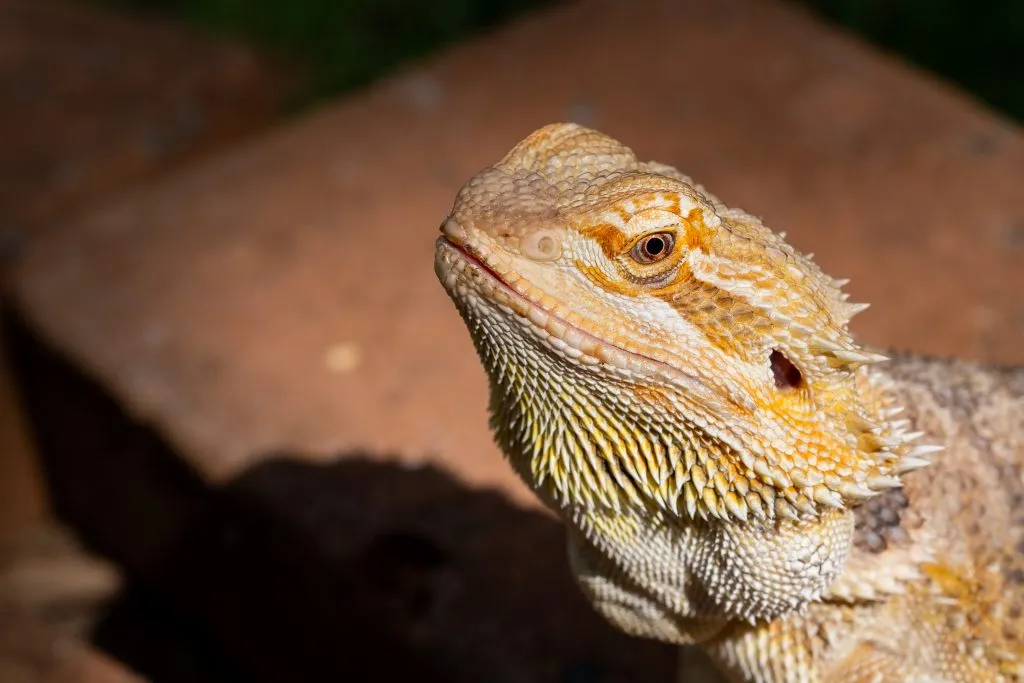
Loss of weight and muscle mass can give a bearded dragon the appearance of sunken eyes.
Diseases or ailments, stress, or consistently low
If the underlying cause is not a disease, then corrections in husbandry are easier to do.
To encourage a beardie to gain weight, increase the protein it eats daily between 10% and 20%. Protein will help increase muscle mass, not fat.
According to the Journal of Herpetological Medicine and Surgery, proper diets for adult bearded dragons should consist of “90% vegetable matter and 10% animal matter.” Juveniles must “consume 50% vegetable and 50% animal matter.”
Takeaways
Sunken eyes should not be ignored. They are tell-tale signs that all is not well with your beardie. They usually signal that your pet may be dehydrated.
Various factors, including high humidity levels, a lack of recognition of drinking water, and high temperatures can cause dehydration. Adjusting husbandry practices to proper procedures can efficiently address dehydration.
Sunken eyes are also symptoms of a disease or a parasitic infection, contributing to weight loss. In that case, you may need the urgent intervention of a veterinarian.
- Enchi Ball Python: A Unique and Stunning Morph of Python regius - March 27, 2025
- Emerald Tree Monitor: The Enigmatic Green Guardian of the Rainforest - March 26, 2025
- The Egyptian Cobra (Naja haje): A Fascinating Serpent - March 25, 2025
